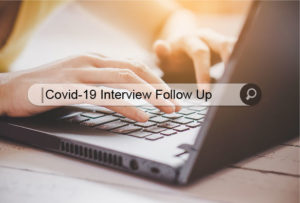
The coronavirus pandemic has had a major impact on companies, but even as employers are downsizing their workforces, many companies are also continuing their recruiting and hiring process. If you have been fortunate enough to land one or more interviews during this uncertain time, it’s important to follow up, but how do you approach hiring managers who are likely stressed and overwhelmed? Career expert Lindsay Tigar (How to follow up during a pandemic without being a jerk) suggests that you need a careful balance of patience and professionalism to nudge someone effectively. Her candid advice: don’t be a jerk—especially during this pandemic when hiring managers and HR departments are experiencing more pressure than usual.
If you’re wondering how to approach following up after an interview during these challenging times, here are some things to think about:
Ask about the timeline during the interview. In a conversation with LinkedIn journalist Andrew Seaman (Job interviews during a pandemic), career coach Sarah Johnston advises job seekers to request specific information about the company’s timeline and hiring plans before the interview is concluded. Asking about the timeline can give you the opportunity to demonstrate your awareness of the challenges hiring managers are currently facing and to convey some empathy while trying to gauge where you stand in the hiring process.
Know your audience. Following up by email gives you another opportunity to recognize what your interviewer is probably going through while asking about the status of the hiring process. For example:
Dear [Interviewer],
I hope you are staying healthy during this difficult time. I really enjoyed meeting you for our interview on [date]. I’m just checking in to find out if I’m still in the running for [job title]? I appreciate your candor.
Best,
[Name, phone and email]
Keep it short and simple. The above example is simple and direct. While you may want to add a bit more to your follow up, you should not write a long recap about who you are and why you’re the best candidate for the job. The goal is for the recipient to be able to respond to you easily. Keep your follow up to a maximum of 5 to 8 sentences.
Space out the follow-ups. When waiting to hear back after an interview, a few days can feel like forever, but the hiring process typically moves slowly under normal circumstances and probably even slower during this pandemic. Before you shoot off one email after another to check in, executive career coach Elizabeth Pearson suggests pausing and thinking about the receiver. As education reporter Annie Nova (Trying to get hired amid the pandemic? Here are some tips) points out, hiring managers and HR staff at prospective employers may be swamped with tasks other than recruiting, working from home while caring for their children or simply not have answers to provide right now. Pearson says the golden rule of follow up is a full five-business-day stretch. If you haven’t heard back after a week, sending a follow up email is acceptable.
Don’t take it personally. If you haven’t heard back for a few weeks, it could mean the employer has hired someone else, but it could also mean that the employer has decided not to fill the position at this time or that the process has been put on hold temporarily. During this pandemic there could be any number of reasons why you are not hearing back, so it’s important that you not take the lack of response personally. If you’ve made a persistent effort to follow up, it’s better to move on to other opportunities and not get discouraged.
Don’t express frustration or act entitled. No matter how tired, frustrated or anxious you are feeling, a follow-up email is not the place to let it all out. Regardless of how many times you’ve reached out or how ideal a candidate you are for a job, you won’t always hear back after an interview. Even if you feel that the hiring manager is being unprofessional by not responding to your follow up, it’s important that the tone of your emails or other messages is always positive and respectful. You never know what opportunities may occur down the road, so you don’t want to burn any bridges with potential employers.
With so much unknown because of the coronavirus pandemic, hiring processes may be slower and more chaotic as employers navigate the challenges and disruption we are all facing. Career coach Adunola Adeshola (5 Ways To Stand Out In Your Job Search During The Coronavirus Pandemic) encourages job seekers to be patient. Following up after interviews may be more challenging in the current environment, but it is still the most effective way to show employers that you’re available and ready to go. If you’re willing to be adaptable and persistent in your follow up, you can demonstrate to a potential employer that you’re not only serious about the opportunity but also that you can handle challenge and change in these uncertain times.
